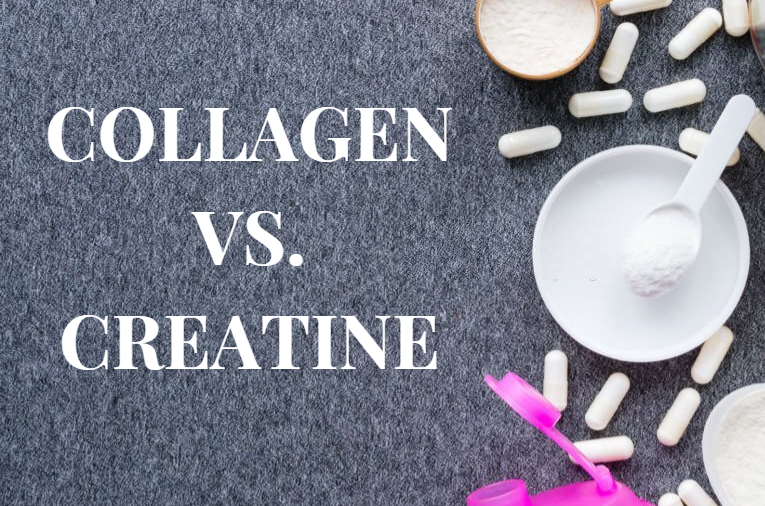Imagine a captivating tango where strong muscles ripple beneath glowing skin, and radiance emanates from within. Well, who doesn’t dream of it?
Concerning the idea, two titans emerge from dietary supplements – collagen and creatine. Despite their similarities in benefits, they function differently in the body.
So, collagen vs. creatine: what do they offer?
Collagen provides structural support to connective tissue, whereas Creatine increases the availability of ATP. Collagen’s recommended dose is 2.5-15 grams per day and is typically taken on an empty stomach. Whereas Creatine is taken 3-5 grams per day and is typically taken before or after exercise.
Let’s find out in my article what science have to say about this.
Collagen And Creatine: What Do They Do To You?
Collagen is a vital protein in the human body and is the primary building block of all connective tissues. Collagen can be located in various body parts, such as muscles, cartilage, skin, blood vessels, and more.
It is necessary for different bodily functions, such as:
- wound healing,
- muscle growth,
- joint health,
- gut health,
- hair, and nail growth.
However, as people age, collagen production slows, leading to negative effects like joint pain, muscle loss, and sagging skin. This is where Collagen supplementation comes in.
Collagen peptides are derived from animal sources like cows, chickens, and fish and are hydrolyzed into a form the body can digest and absorb. When consumed, Collagen peptides break down into three primary amino acids;
- Glycine
- Proline
- Hydroxyproline
These stimulate the body to produce more Collagen. It is a viable option for individuals deficient in Collagen, and it can enhance muscle building and help fight aging-related effects.
On the other hand, Creatine is an amino acid naturally found in our muscles and produced by our body. The combination of three amino acids forms it:
- Arginine,
- Glycine,
- Methionine.
Generally, a typical omnivorous diet can provide about 1 gram of creatine daily. But people involved in muscle building and high-intensity exercises often need extra creatine for additional energy during exercise.
The main function of creatine is to increase the amount of phosphate stored in the muscles. That provides additional energy during high-intensity exercise. This leads to an improvement in strength, power, and overall athletic performance.
Find out the impact of creatine on your body.
Creatine supplementation can also reduce muscle damage caused by intense workouts and improve muscle recovery. Apart from its benefits for athletes, creatine may also have some potential benefits for older adults looking to maintain muscle mass and cognitive function.
Research has shown that creatine can improve cognitive function in vegetarians and those with cognitive disorders.
Creatine is considered a safe supplement when used responsibly and under the guidance of a healthcare professional. However, some people may experience side effects like stomach upset, muscle cramping, and dehydration if too much Creatine is taken.
It is also not appropriate for everyone, especially those with kidney or liver disease.

Collagen vs. Creatine: Who Wins The Battle?
Collagen and creatine are used for different purposes.
Collagen helps improve skin health, promote joint function, and reduce the signs of aging. They may also have benefits for hair and nail health. On the other hand, creatine is primarily used to enhance muscle strength and performance during exercise.
In the end, it depends on your goal and preference – what you want to achieve from a particular supplement.
Let’s look at the comparison table to decide how effective these supplements improve your fitness and health.
| Category | Collagen | Creatine |
| Source | Can be sourced from animal bones, skin, or scales | Can be synthesized in the body from amino acids |
| Benefits | May improve and support- skin hydration, reduces the appearance of wrinkles, Support joint health, improve exercise performance. | May improve and support- exercise performance by increasing energy availability, increase muscle mass and strength, have cognitive and anti-inflammatory benefits. |
| Mechanism Of Action | Provides structural support to connective tissue. May stimulate Collagen synthesis in the body. | Increases the availability of ATPSupport muscle function |
| Dosage And Timing | The recommended dose of 2.5-15 grams per day, depending on the form and purpose of the supplement. Typically taken before bed or on an empty stomach. | The recommended dose is 3-5 grams per day, with a loading phase of up to 20 grams daily for the first week. Typically taken before or after exercise |
| Chemical Composition | Contains high levels of glycine, proline, and hydroxyproline. May also contain minerals such as calcium and magnesium | Composed of three amino acids: glycine, arginine, and methionine |
| Effects On Brain Function | Limited evidence suggests Collagen may improve cognitive function in older adults | Some studies suggest creatine may improve cognitive function and memory in healthy individuals |
| Population Groups | May be particularly beneficial for older adults, athletes, and individuals with joint pain or skin concerns | May be particularly beneficial for athletes and individuals looking to improve exercise performance or muscle mass |
| Side Effects | rarely causes any side effects | May experience bloating, cramping, or gastrointestinal discomfort (diarrhea, nausea, etc.) |
| Legal Status | Generally available as a dietary supplement in most countries | Generally available as a dietary supplement in most countries. Approved by sports organizations as a performance-enhancing drug. |
Can You Mix Collagen and Creatine?
Mixing Collagen and creatine is safe and can benefit muscle growth and maintenance. No evidence suggests any interference between Collagen and creatine absorption. In fact, collagen and creatine are complementary.
Because Collagen helps contribute to your daily protein intake to maintain muscle mass, while creatine encourages further muscle growth.
Shared Benefits Of Collagen And Creatine
Combining Collagen and creatine supplements provides multiple benefits that can help improve your fitness goals.
- Creatine increases your phosphocreatine stores, while Collagen slows down carbohydrate digestion to provide more sustained energy.
- A combination of both supplements, along with carbs like Gatorade, can lead to the ultimate energy-boosting cocktail. Taking Collagen and creatine together encourages muscle growth.
- Collagen peptides count towards your daily protein intake, and supplementing with Collagen peptides can improve body composition and muscle strength. Creatine supplementation stimulates muscle protein synthesis and provides more energy for strength training.
- By stacking these two supplements, you can maximize their effects on muscle growth, energy levels, and consistency in taking supplements.
How To Take Collagen And Creatine Together?
To mix Collagen powder and creatine without clumping, follow my instruction.
- Pour 1-2 oz of room temperature or warm liquid into a glass. The cold liquid may result in clumps.
- Add the desired amount of Collagen and creatine powder to the glass and mix using a shaker, blender, or milk frother until everything is dissolved.
- Once dissolved, top off with more of your desired liquid and add ice to make your beverage colder and more enjoyable.
To avoid any digestion issues, set a lower dose of creatine.
Learn what you can mix with creatine.
Does Collagen Make You Gain Muscle?
Researchers have suggested that supplemental collagen may promote the synthesis of muscle proteins such as creatine and stimulate muscle growth after exercise ( NEW15 ). However, collagen protein isn’t more effective than whey protein for building muscle or strength.

Conclusion
Collagen and Creatine are unique supplements to enhance endurance, muscle growth, and performance. Both have some of their individual effects, of course. So, choose wisely that serves you best.
You can visit our blogs to learn more about creatine and other supplements you can mix it with.

I started my professional career as a sports medicine consultant in Rola, Missouri. My primary role was to suggest suitable supplements for my patients according to their pre-existing conditions and lifestyle goals. I believe a healthy lifestyle is the most important if you want to make your life really meaningfull.


